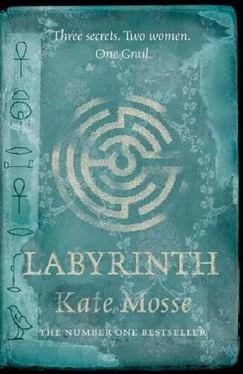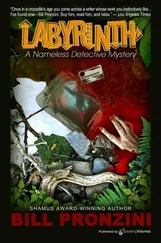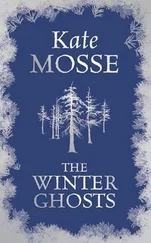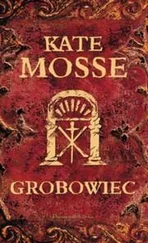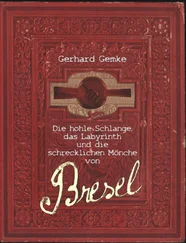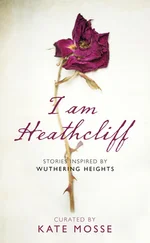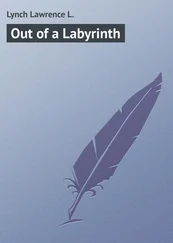There was a shout. Guilhem turned round to see the line of prisoners had reached the foot of the mountain and were now being driven towards the pyre. They walked quietly and with dignity. They were singing. Like a choir of angels, Guilhem thought, seeing the look of discomfort the sweetness of the sound brought to the faces of the spectators.
The seneschal of Carcassonne stood shoulder to shoulder with the Archbishop of Narbonne. On his sign, a gold cross was raised high in the air and the black friars and clergy moved forward to take up their position in front of the palisade.
Behind them, Guilhem could see a row of soldiers holding burning torches. They were struggling to keep the smoke from drifting over to the stands as the flames whipped and cracked in the bitter, gusting north wind.
One by one, the names of the heretics were called out. They stepped and climbed the ladders into the pyre. Guilhem felt numb with the horror of it. He hated the fact he could do nothing to stop the executions. Even if he’d enough men with him, he knew they themselves not wish it. Through force of circumstance rather than belief, Guilhem had spent much time in the company of the Bons Homes . He admired and respected them, though he could not claim to understand them.
The mounds of kindling and straw had been soaked in pitch. A few soldiers had climbed inside and were chaining the parfaits and parfaites to the central posts.
Bishop Marty began to pray.
“Payre sant, Dieu dreiturier dels bons esperits.”
Slowly, other voices joined his. The whispering grew and grew, until soon it became a roar. In the stands, the spectators exchanged embarrassed glances with one another and grew restless. This was not what they had come to see.
The Archbishop gave a hurried signal and the clergy began to sing, their black robes flapping in the wind, the psalm that had become the anthem of the Crusade. Vent Spirite Sancti , the words shouted to drown out the Cathar prayers.
The bishop stepped forward and cast the first torch onto the pyre. The soldiers followed his lead. One by one the burning brands were tossed in. The fire was slow to catch, but soon the sparks and crackles became a roar. The flames started to writhe through the straw like snakes, darting this way and that, billowing and puffing, swirling like reeds in the river.
Through the smoke, Guilhem saw something that turned his blood to ice. A red cloak, embroidered with flowers, a deep green dress, the colour of moss. He pushed his way to the front.
He couldn’t – didn’t want – to believe his eyes.
The years fell away and he saw himself, the man he had been, a young chevalier , arrogant, proud, confident, kneeling in the capela Santa-Mari. Alais was at his side. A Michaelmas wedding, lucky some said. Flowering hawthorn on the altar and the red candles flickering as they exchanged their vows.
Guilhem ran along the back of the stands, desperate to get closer, desperate to prove to himself that it was not her. The fire was hungry. The sickly smell of burning human flesh, surprisingly sweet, was floating over the spectators. The soldiers stood back. Even the clergy were forced to retreat as the furnace burned.
Blood hissed as the soles of feet split open and the bones slid out into the fire, like animals roasting on a spit. The prayers turned to screams.
Guilhem was choking, but he didn’t stop. Holding his cloak across his mouth and nose to keep out the foul, pungent, smoke, he tried to get close to the palisade walls, but the swirling cloud of smoke obscured everything.
Suddenly a voice rang out, clear and precise, from within the fire.
“Oriane!”
Was it Alais’ voice? Guilhem couldn’t tell. Shielding his face with his hands, he stumbled towards the noise.
“Oriane!”
This time, there was a shout from the stands. Guilhem spun round and through a gap in the smoke, saw Oriane’s face contorted with anger. She was on her feet and gesturing wildly to the guards.
Guilhem imagined he was shouting Alais’ name too, but he couldn’t risk drawing attention to himself. He had come to save her. He had come to help her escape from Oriane, he had helped her once before.
Those three months he had spent with Alais after fleeing the Inquisitors in Toulouse had been, quite simply, the happiest time of his life.
Alais would not stay longer and he could not persuade her to change her mind, nor even to tell him why she had to go. But she had said – and Guilhem had believed it to be true – that one day, when the horror was over, they would once more be together.
“ Mon cor ,” he whispered, almost a sob.
That promise, and the memory of days together, were what had sustained him through the ten long, empty years. Like a light in the dark.
Guilhem felt his heart crack. “Alais!”
Against the red cloak, the small white sheepskin package, the size of a book, was burning. The hands that held it were no longer there. They had been reduced to bone and spitting fat and blackened flesh.
There was nothing left, he knew it.
For Guilhem, everything was silent now. There was no more noise, no more pain, nothing but a clear white expanse. The mountain had gone, the sky and the smoke and the screaming had gone. Hope had gone.
Now, his legs could no longer hold him. Guilhem fell to his knees as despair claimed him.
Sabarthes Mountains
FRIDAY 8 JULY 2OO5
The stench brought him to his senses. A mixture of ammonia, goat droppings, unwashed bedding and cold, cooked meat. It stuck in his throat and made the inside of his nose burn, like smelling salts held too close.
Will was lying on a rough cot, not much more than a bench, fixed to the wall of the hut. He maneuvered himself into a sitting position and leaned back against the stone wall. The sharp edges stuck into his arms, which were still tied behind his back.
He felt he’d done four rounds in the boxing ring. He was bruised from head to toe where he’d been thrown against the side of the boot on the journey. His temple was throbbing where Francois-Baptiste had struck him with the gun. He could feel the bruise beneath the skin, hard and angry, and the blood around the wound.
He didn’t know what time it was or what day it was. Friday still?
It had been dawn when they left Chartres, maybe as early as five o’clock. When they had got him out of the car it had been afternoon, hot and the sun still bright. He twisted his neck to try to see his watch, but the movement made him feel sick.
Will waited until the nausea had passed. Then he opened his eyes and tried to get his bearings. He appeared to be in some sort of shepherd’s hut. There were bars on the small window, no bigger than the size of a book. In the far corner there was a built-in shelf, like some sort of table, and a stool. In the grate alongside there were the remains of a long-dead fire, grey ash and black shavings of wood or paper. A heavy metal cooking pot hung on a stick across the fireplace. Will could see cold fat coagulated around the rim.
Will let himself fall back on the hard mattress, feeling the rough blanket on his battered skin, and wondered where Alice was now.
Outside, there was the sound of footsteps, then a key in a padlock. Will heard the metallic chink of chain being dropped on the ground, then the arthritic creak of the door being pulled open and a voice he half-recognised.
“ C’est l’heure .” Time to go.
Shelagh was conscious of the air on her bare arms and legs and the sensation of being moved from one place to another.
She identified Paul Authie’s voice somewhere in the murmur of sound as she was transported from the farmhouse. Then the distinctive feeling of underground air on her skin, chill and slightly damp, the ground sloping down. Both the men who had held her captive were there. She’d got accustomed to the smell of them. Aftershave, cheap cigarettes, a threatening maleness that made her muscles contract.
Читать дальше
